Eucalyptus oil: Nilgiri Tel Benefits, How To Use, Dose, Side Effects
Eucalyptus oil used in the present ayurvedic pharmaceutical industries for the treatment of nasal congestion, arthritis pain relief etc.
Botanical name – Eucalyptus globulus Labill
Family- Myrtaceae (Lavanga Kula)
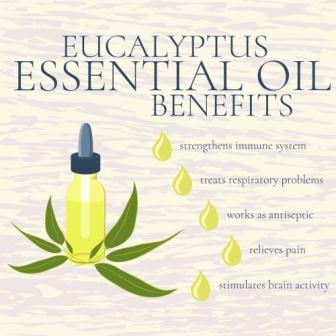
Table of Contents
Vernacular names
Names in different languages:
Hindi Name- Neelgiri
English Name- Tasmanian blue-gum eucalyptus
Telugu name- Neelagiri chettu
Kannada name – Neelagiri
Many of the Indian languages use the word ‘Neelagiri’ to describe this tree.
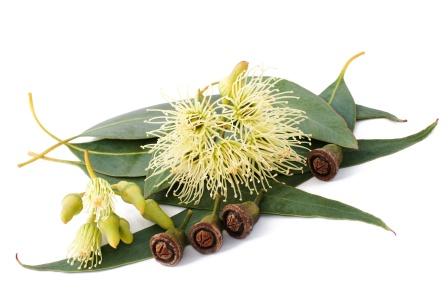
This tree is a native of Australia. In India, it is grown in the Neelagiri hilly regions of South India; hence the name Neelagiri. The tree grows up to a height of 50- 70 m with a straight trunk. A bluish colored exudate is found in the bark of the tree if a slight cut is made. The root of the tree is purgative in nature. There are about 700 species of eucalyptus found around the world.
Sanskrit synonyms
Sugandha patra- Pleasant smell of the leaves
Neela niryasa- Bluish colored exudate
Harita parna- The leaves are always green colored
Tailaparna- The leaves contain oil
Jvarahara – Useful in Fever
Kitamardha – Beneficial in worm infestation
Scientific classification
Kingdom: Plantae
(unranked): Angiosperms
(unranked): Eudicots
(unranked): Rosids
Order: Myrtales
Family: Myrtaceae
Subfamily: Myrtoideae
Tribe: Eucalypteae
Genus: Eucalyptus L’Hér.
Properties, part used, dosage
Properties-
Guna (Qualities)- Laghu ( Light to digest), Snigdha ( Unctuous)
Rasa (Taste)- Katu (Pungent), Tikta (Bitter), Kashaya (Astringent)
Vipaka- Katu (Undergoes pungent taste conversion after digestion)
Veerya (Potency)- Ushna (Hot)
Effect on Tridosha: Karma- Kapha-pitta hara (reduces vitiated kapha and pitta dosha),
Balya (Provides Strength),
Vedanahara (pacifies pain)
Pharmacological actions – Analgesics, Anthelmintic, Anti inflammatory, Antipyretic
Parts used:
Leaves, Oil extracted from the leaves and tree, Exudate
Dose:
Leaf Powder- 1-2 g
Exudate- 1- 2 g
Cold infusion- 20-30 ml
Oil – 2-4 drops
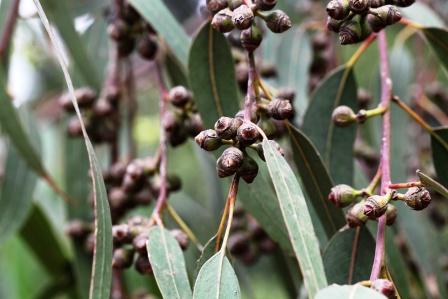
Chemical composition
Eeucalyptus globulus is the main commercial source of eucalyptus oil; yield is 2.12%; 1, 8-cineole exceeds 70%. Several potent euglobals are isolated from the leaves and flower buds. These compounds inhibition of TPV induced Epstein Barr Virus activation. Phloroglucinol derivatives, isolated from the leaves, show better anti- inflammatory activity than indomethacin. Natural antioxidants are also found in the plant. The leaves and bark also contain Dihydroflavonol, Gallotannins, p-coumaric acid and cinnamic acid.
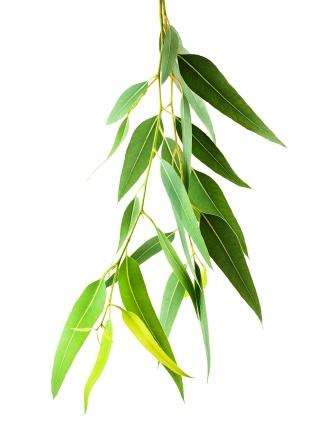
Uses of Tailaparni
- The oil extracted from the leaves of the eucalyptus plant is rubbed gently to relieve pain in the joints, muscles and relax the affected area.
- The eucalyptus oil is added with gels, ointments and commercially manufactured as pain balms or pain relieving oil.
- The steam of the oil is inhaled to get relief from nasal congestion during cold, diseases of the lungs, cough.
- Enema is given from the oil of eucalyptus to treat patients suffering from intestinal worms.
- The exudate of the eucalyptus plant is mixed with water and given to treat dysentery and irritable bowel syndrome.
- The powder of the dried leaves of eucalyptus is burnt and the smoke coming from the burnt leaves is exposed to wounds having pus to relieve pus and pain from such wounds.
- Cold infusion prepared from the leaves of eucalyptus is given in a dose of 30-40 ml,in divided dose, to treat fever.
Sanskrit verse
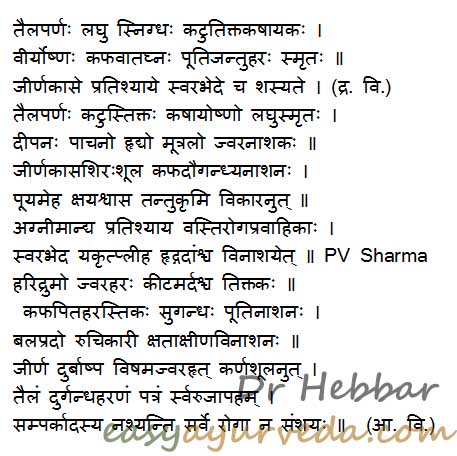
Uses, indications
Traditional uses and qualities of Neelgiri:
Laghu – light to digest
Snigdha – unctuous, oily
Pootihara – relieves bad smell
Deepana – improves digestion strength
Pachana – Digestive, relieves Ama Dosha
Hrudya – acts as cardiac tonic, congenial for heart
Mutrala – diuretic
Traditional Indications of Nilgiri Tel:
Jantu – worm infestation
Jeerna Kasa – cough, cold
Pratishyaya – running nose, coryza
Svarabheda – hoarseness of voice
Jwara – fever
Shirashoola – headache
Pooyameha – Pyuria
Kshaya – depletion of body tissues, weight loss, tuberculosis
Shwasa – asthma and chronic respiratory disorders
Agnimandya – low digestion strength
Bastiroga – Urinary tract disorders
Karnashoola – Earache
Ruja – pain
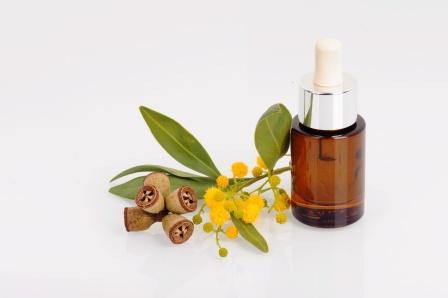
Interaction with medicines, supplements
Can this be used while taking Homeopathic medicine?
Yes. This product does not react with homeopathic medicine.
Can this medicine be continued while taking supplements like multivitamin tablets, Omega 3 fatty acids etc?
Yes. Generally, this product goes well with most dietary supplements. However, if you are taking more than one product per day, please consult your doctor for an opinion.
With western
medicines
Seek your
doctor’s advice if you are taking this product along with other western
(allopathic / modern) medicines. Some Ayurvedic herbs can interact with modern
medicine.
If both Ayurvedic and allopathic medicines are advised together, then it is
best to take Allopathic medicine first, wait for 30 minutes and then take the
Ayurvedic medicine.
Research, Side effects
Research articles related to Tailaparni:
Anti bacterial effect of eucalyptus: The results obtained from the study showed that essential oil of the leaves of globulus has antimicrobial activity against gram negative bacteria (E. coli) as well as gram positive bacteria (S. aureus). The encouraging results indicate the essential oil of E. globulus leaves might be exploited as a natural antibiotic for the treatment of several infectious diseases caused by these two germs, and could be useful in understanding the relations between traditional cures and current medicines.
Essential oils (EO) of eucalyptus (Eucalyptus globulus), thymus (Thymus capitatus L.) pirul (Schinus molle L.) were evaluated for their efficacy to control Aspergillus parasiticus and Fusarium moniliforme growth and their ability to produce mycotoxins. The IC50 was used to evaluate spore germination kinetic and mycotoxin production. Also, spore viability was evaluated by the MTT assay. All EO had an effect on the radial growth of both species.
Side effects of Eucalyptus oil:
Nausea, stomach irritation are seen in some people, especially on long term usage or use in higher doses.
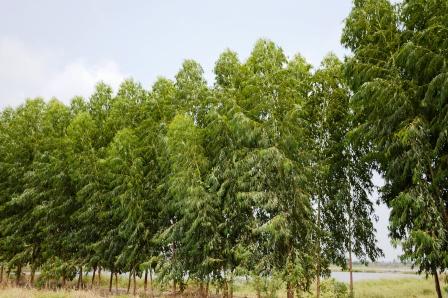
Ayurvedic formulations
Formulations containing Eucalyptus:
. However the oil of the eucalyptus plant is used in ayurvedic pain balms and oils to treat joint pain, muscle pain, headache. The oil is also used as nasal drops for nasal decongestion during cold and cough.
Used in gels and pain relief oils like – Jointcare gel, Panchgun Tel
Used in cough syrups like – Zeal Cough Syrup.
Author: Dr.B.K.Prashanth M.D (Ayu), Ph.D E mail: [email protected]
Systemic Action
Externally – It has antimicrobial properties. Oil can be used to prevent bad body odor. External application of its oil mixed with Mustard oil is beneficial in joint diseases. Also beneficial in Pulmonary diseases, Tuberculosis, Cough, etc.
Internally
Nervous system –stimulant. Indicated in Headache, joint pain (diseases of vata origin)
Digestive system – In lower dose its oil has carminative, digestive, action. facilitate movement of doshas in the proper direction. It has an Anthelmintic property. Its resin is Astringent in taste, and acts as absorbent. Over dose of its oil can cause vomiting and diarrhea. Indicated in loss of appetite, bloating, helminthiasis etc. Basti with its oil is also beneficial in Tape worm infestation. Its resin is beneficial in Diarrhea, Malabsorption syndrome, etc.
Circulatory System – In lower doses it acts as cardiac stimulant. But higher doses can weaken the Heart.
Respiratory System – Helps to eliminate excess kapha dosha from the respiratory passage . Indicated in kasa (Cough), Hoarseness of voice, and in other respiratory illnessExcretory system – Helps to increase urine production. Indicated in urinary tract infection – Puya meha (Pus in urine)
Skin – Stimulate sweat production
Tapakrama – Decoction of its leaf or powder of dried leaf is indicated in Fever (Jirna jvara and Vishama jvara)











6 comments
Roo
Hi. What do you think of using essential oils as cologne (applying to wrist & neck daily)? What would you use as fragrance that’s easy to get today? Thanks.
Dr J V Hebbar MD(Ayu)Author
I do not apply any essential oil or body sprays. I just spray a good perfume over the cloth.
Natural essential oils such as lavender oil, jasmine oil etc – 2 – 3 drops is fine to use over skin provided the person is not allergic to them.
Rashmi
The article is very informative with all technical information simplified for common people. The use of Sanskrit knowledge with original Sanskrit words is highly appreciable.
Dr J V Hebbar MD(Ayu)Author
Thank you.
Matthew Dee
Which kind of nilgiri oil can be taken for relief of soft tissue arthritis. Matt,in Dublin
Dr J V Hebbar MD(Ayu)Author
This one.
http://www.boots.ie/botanics-aromatherapy-pure-essential-eucalyptus-oil-10ml-10031672